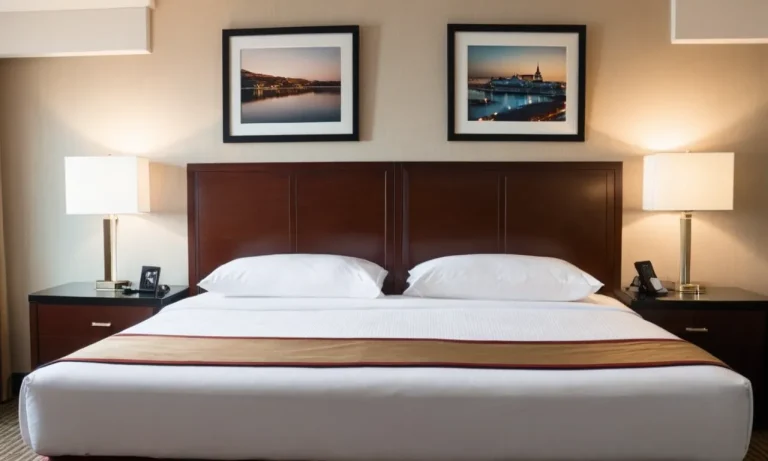What Does Room Only Mean When Booking A Hotel?
Navigating the world of hotel bookings can be a daunting task, especially when faced with various accommodation options and terminology. One term that often leaves travelers scratching their heads is ‘room only.’
If you’re planning a trip and considering different hotel packages, understanding what ‘room only’ entails is crucial to making an informed decision.
If you’re short on time, here’s a quick answer to your question: Room only means that you are booking just the room itself, without any additional services or amenities included in the rate.
In this comprehensive article, we’ll delve into the intricacies of ‘room only’ bookings, exploring what it covers, what it excludes, and the potential advantages and disadvantages of choosing this option.
We’ll also provide insights into when it might be suitable to opt for a ‘room only’ package and offer tips for maximizing your hotel stay experience.
Understanding the Basics of ‘Room Only’ Bookings
When booking a hotel stay, you’ll often come across the term “room only.” But what exactly does it mean? Don’t worry, it’s not as complicated as it sounds! A “room only” booking is simply the most basic hotel package, which includes just the room itself and nothing else. It’s a straightforward option for travelers who prefer to keep things simple or have specific preferences for meals and activities.
What is included in a ‘room only’ booking?
- The room itself, with basic amenities like a bed, bathroom, TV, and Wi-Fi (depending on the hotel)
- Access to common areas like the lobby, swimming pool, and fitness center (if available)
What is not included in a ‘room only’ booking?
- Meals (breakfast, lunch, or dinner)
- Snacks or beverages (unless complimentary in the room)
- Additional services like spa treatments, airport transfers, or guided tours
Comparing ‘room only’ with other hotel packages
While “room only” is the most basic option, hotels often offer more inclusive packages as well. For example, a “bed and breakfast” package typically includes the room plus a morning meal. An “all-inclusive” package, on the other hand, covers the room, meals, drinks, and sometimes even activities or entertainment.
According to a survey by TravelPulse, nearly 60% of travelers prefer all-inclusive packages for the convenience and value they offer.
Ultimately, the choice between “room only” and a more inclusive package comes down to personal preference and budget. If you’re looking to save money or have dietary restrictions, a “room only” booking might be the way to go.
But if you’re seeking a hassle-free experience with everything taken care of, an all-inclusive package could be worth the extra cost. Whichever option you choose, make sure to read the fine print and understand exactly what’s included (and what’s not) to avoid any surprises during your stay. 😉
| Package Type | Room | Meals | Drinks | Activities |
|---|---|---|---|---|
| Room Only | ✔ | ❌ | ❌ | ❌ |
| Bed & Breakfast | ✔ | Breakfast Only | ❌ | ❌ |
| Half Board | ✔ | Breakfast & Dinner | ❌ | ❌ |
| All-Inclusive | ✔ | ✔ | ✔ | ✔ |
No matter which option you choose, booking a hotel stay can be an exciting part of planning your next adventure. With a clear understanding of what “room only” means, you can make an informed decision and enjoy your trip to the fullest! 🎉
Advantages of Choosing a ‘Room Only’ Option
Flexibility and customization
One of the primary advantages of opting for a ‘room only’ booking is the flexibility and customization it offers. By choosing this option, you have the freedom to tailor your stay to your specific preferences and needs.
You can explore the local dining scene, indulge in the cuisine of your choice, and enjoy meals at your desired pace and budget. This level of flexibility is particularly appealing for travelers who prefer to immerse themselves in the local culture and culinary experiences.
According to a survey by TripAdvisor, over 60% of travelers prioritize trying local cuisine when visiting a new destination.
Cost savings for budget-conscious travelers
Booking a ‘room only’ option can be a budget-friendly choice, especially for cost-conscious travelers. By avoiding the added expense of pre-paid meal plans or packages, you can potentially save a significant amount of money.
This approach allows you to allocate your funds more strategically, whether it’s towards other aspects of your trip or simply stretching your travel budget further. According to Statista, in 2022, approximately 38% of travelers cited budget as a major factor when booking accommodations.
😊 By choosing a ‘room only’ option, you can enjoy a comfortable stay while keeping your expenses in check.
Ideal for short stays or business trips
The ‘room only’ option is particularly well-suited for short stays or business trips. When you’re on a tight schedule or have limited time in a destination, the flexibility of this option allows you to maximize your time efficiently.
You can grab a quick bite on the go, attend meetings or conferences without being tied to set meal times, and explore the city at your own pace. For business travelers, this approach can be a game-changer, as it eliminates the need to factor in costly meal packages or rigid dining schedules.
A study by Global Business Travel Association revealed that 78% of business travelers prefer the convenience and flexibility of ‘room only’ bookings. 👍
Potential Drawbacks of ‘Room Only’ Bookings
Limited amenities and services
When you book a “room only” reservation, you’re essentially paying for just the room itself without any additional perks or amenities. This means you won’t have access to complimentary services like breakfast, Wi-Fi, parking, or access to the hotel’s fitness center or pool.
According to a Travel + Leisure article, these amenities can add significant value to your stay, and not having them included could result in extra costs or inconveniences.
Potential for hidden costs
While a “room only” rate may seem like a bargain upfront, it’s important to consider the potential for hidden costs. For example, you may have to pay extra for things like parking, resort fees, or even simple amenities like bottled water or coffee in the room.
A Forbes Advisor article estimates that these additional fees can add up to $50 or more per night, potentially negating any savings from the “room only” rate.
Lack of convenience for some travelers
For some travelers, a “room only” booking may not offer the convenience they desire. Without access to hotel amenities like a restaurant or room service, you’ll need to venture out for meals or snacks.
This can be especially inconvenient for business travelers or families with young children who prefer the convenience of on-site dining options. Additionally, not having access to things like a hotel gym or pool can make it harder to maintain your routine or keep kids entertained during your stay.
While “room only” rates can be a great option for budget-conscious travelers or those who prefer to explore the local dining scene, it’s important to weigh the potential drawbacks. Consider your travel style and priorities to determine if the potential savings are worth the trade-offs.
Alternatively, you may find that an all-inclusive package or a room with added amenities offers better value and a more convenient experience for your needs.
When to Consider a ‘Room Only’ Booking
Traveling on a tight budget
If you’re a budget-savvy traveler looking to stretch your vacation dollars, a ‘room only’ booking can be a fantastic option. By foregoing the inclusive meal plans, you can potentially save a significant amount of money, especially if you’re traveling as a family or group.
According to a survey by TripAdvisor, travelers can save up to 30% on their hotel costs by opting for room-only rates. 😎
However, it’s essential to plan your dining options carefully. Consider exploring local markets or grocery stores to stock up on snacks and ingredients for simple meals. Many hotels offer in-room kitchenettes or access to shared kitchens, allowing you to prepare your meals and save even more.
Don’t forget to check out local food trucks or budget-friendly eateries recommended by locals or travel blogs for an authentic and cost-effective dining experience. 👍
Preferring a la carte options
For some travelers, the freedom of choice is paramount. A ‘room only’ booking allows you to tailor your dining experiences to your preferences and dietary restrictions. Rather than being confined to the hotel’s set menus, you can explore a variety of culinary options, from trendy restaurants to local street food vendors.
This flexibility is particularly appealing for foodies or those with specific dietary needs, such as vegans, vegetarians, or those with food allergies or intolerances.
Additionally, booking ‘room only’ can be a great way to sample the local cuisine and immerse yourself in the destination’s cultural heritage. By dining out, you’ll have the opportunity to interact with locals, learn about traditional dishes, and create unforgettable memories.
According to a survey by Lonely Planet, over 80% of travelers cited trying local cuisine as one of the top reasons for choosing a destination. 🍽️
Exploring local dining and entertainment
For some travelers, the allure of a destination lies in its vibrant local scene, including dining, nightlife, and entertainment. By booking a ‘room only’ option, you’ll have the freedom to explore the city’s culinary and cultural offerings at your own pace.
This can be particularly appealing for those who enjoy spontaneous adventures or prefer to plan their activities as they go.
Imagine strolling through charming neighborhoods, stumbling upon hidden gems, or joining locals at lively cafes and bars. You’ll have the flexibility to indulge in late-night snacks or extend your evenings without worrying about missing out on pre-paid meals at the hotel.
According to a study by World Tourism Blog, over 60% of travelers cited experiencing local culture as a key factor in choosing their travel destinations. 🎉
Conclusion
The ‘room only’ option in hotel bookings offers a straightforward and flexible approach for travelers seeking a no-frills accommodation experience. By understanding what it entails and weighing the pros and cons, you can make an informed decision that aligns with your travel preferences, budget, and desired level of convenience.
Whether you’re a budget-conscious explorer seeking cost savings or a business traveler prioritizing simplicity, a ‘room only’ booking can be a viable choice. However, it’s essential to carefully consider your specific needs and preferences to ensure a comfortable and enjoyable hotel stay.








